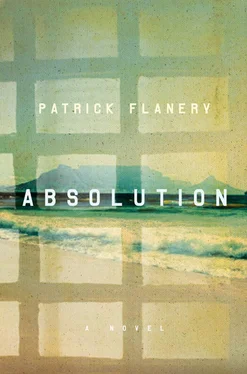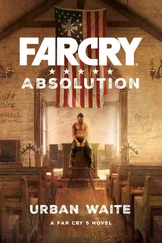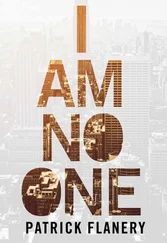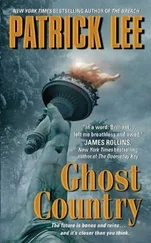And me? What of me? What should I have said when the men asked, when they shouted? What did I know? I tell myself that I knew nothing that could have changed anything at that point. Earlier, though — if they had come the day before, or the day before that, demanding I confess what I knew of my daughter’s plans and her associates, I can no longer say what I might have given away. And why, I ask myself now, every day that passes, did I not take the chance myself? To save you, to save others, I might have betrayed you. Would a defeat on that day have changed the course of anything, the balance of lives lost against lives saved?
There was no news for you, who knew all that mattered on that day. You clawed in the sand trying to make up your mind — cruel, an ostrich in the wilderness.
The boy understood that his Uncle Bernard had been a soldier once and still called himself a warrior. This was a reason for doing and not doing all kinds of things. A warrior did not listen to music except when going into battle and a warrior trained his body to live on less, to eat only once a day, twice at most. A warrior knew the psychology of his enemy. A warrior had to rely on nature for survival and so a warrior had to be — what was it he said? — intimately acquainted with the bitch.
This meant that when they went on these drives there was no music.
Are we going into battle? Bernard barked, when the boy asked if he could turn on the radio.
No , the boy said, even though he didn’t know if this was the answer Bernard wanted to hear.
Then no music, hey? No battle, no music. You got to keep your mind focussed. Music and food, these things distract a person, man .
Was my father a warrior?
Bernard laughed and rolled down the window and spat into the wind.
The boy remembered car trips with his parents to see his Aunt Ellen in Beaufort West, and once to visit friends in Kenton-on-Sea. The radio was always on, all the time, even if his parents complained that the music was terrible. It was something to drown out the sound of the road and the hot wind that came in through the windows if it was a dry month, or the rain on the roof that hammered them deaf if it was wet. Music made time pass, sped up the hours that seemed so much longer driving fast in a car. The boy would fall asleep to music, especially if it was the old-fashioned music his parents liked, and wake after dark when they arrived on the street where his aunt lived, and felt himself being carried inside by his mother or father and tucked between sheets stretched tight over the cushions of the sofa in his aunt’s lounge, a sofa that smelled like one of his parents’ parties if it were held in a sweet shop or bakery.
On the road that night with Bernard, the boy thought about how he hadn’t seen his aunt in at least a year. He wondered if he would see her again. Somewhere he was sure he had her phone number and address. If only she knew how things were, he couldn’t imagine that she’d let him stay with Bernard. He’d asked Bernard if they couldn’t get a cat or a dog, to have some company on the long trips. I’m not running a blerry zoo , Bernard had said, I don’t like animals .
The boy tried to stay awake, to watch Bernard out of his right eye, the road with his left, but the images kept coming together so that the man’s face turned black and the road turned white. As he fell asleep, the boy imagined that he had the strength to tie Bernard to the front of the truck, so that his head was like a plough or the guard on the front of a train, and he dreamed of driving the truck fast and forward, so that Bernard’s face became black with the road and the road became white with his face.
A Saturday night. At great expense, Greg has Nonyameko come in for the evening so the two of us can go out to dinner. We drive around into the City Bowl, park up on Kloof Street and have a drink with one of the artists represented by Greg’s gallery. The night is warm, so we decide to walk down the hill to Saigon for sushi. As we pass Hoërskool Jan van Riebeeck a young woman comes out of the darkness.
‘Excuse me gentlemen, I don’t mean to be rude,’ she says. Moved by some kind of metropolitan instinct, I turn away. I don’t hear the next words. Out of the corner of my eye I look at her face and clothes, wondering where the clipboard is. She’s either doing a survey for the city, I think, or she’s selling magazine subscriptions, or canvassing for a charity.
Then the story comes out and I can’t help listening. She does odd jobs for people but was unable to find work today. She doesn’t think that ninety rand to pay for a night in the shelter is going to fall out of the sky. She has a daughter. They lost their house. She begins to tremble. I keep my body turned away. New York has hardened me against this kind of plea. But Greg listens, asks me if I have any money, any coins, he doesn’t have any change. I take out my wallet, remove the largest silver coins I have in the change compartment, and ignore the hundreds of rand in notes. The woman has an educated accent; she isn’t drunk and doesn’t appear to be high. As I’ve been trying to decide whether to give her fifteen rand or twenty, she’s covered her face and started to cry. Maybe, I think, she’s a drama student. I knew drama students in New York who were sent out to beg on the streets as a test of their skill. Grades for the exercise were awarded on a scale pegged to how much each student earned in handouts. The thinnest ones always got A’s.
‘Here,’ I say, and empty the coins into her hand. She mumbles, ‘I’m so ashamed, I am so ashamed.’ I know that the money’s too little. I tell her not to be ashamed and hold her gaze and say it again. She has a crescent of dark freckles around her eyes and brow. Her clothes are good but dirty.
‘There’s nothing shameful about asking,’ I say, and we leave her. Fifteen or twenty rand is nothing to me — less than five dollars, less than four.
As we walk down the hill Greg says, ‘I couldn’t pass her knowing that we were going to spend several hundred rand on raw fish and beer. I think she was telling the truth. It could have been drugs or something else, but I think she was telling the truth.’
‘It doesn’t actually matter,’ I say.
*
At the end of our interview yesterday I asked Clare what my purpose was, why she herself didn’t write about her past.
‘You mean why I didn’t choose to write a memoir?’
‘Yes. Or autobiography.’
She had me at the door and was trying to transfer me over to Marie, so that I could be ushered out of the house. ‘I can’t see my life as a totality, or as a continuous narrative. I wouldn’t know how to write my own life in that way.’
‘But what about fragments?’
‘Yes, fragments, I suppose I could write fragments — I have written about moments. Transitional periods. Narratives of personal trauma, specific traumas. I can write about periods of my life but not my whole life. I wouldn’t know what to put in and what to leave out. Or, I guess what I mean is, I would want to leave out so much there would be very little left. That’s why I need you.’
I wasn’t looking for it. The image comes when I don’t want it, in the middle of the night, bloated with fish and beer.
I’m standing at the screen door, not alone. Someone else puts his palm against the wooden frame. He tightens the palm into a fist and knocks three times. It’s a polite knock, not an insistent one. We hear steps inside and then the interior door opens, and we see her face behind the screen. She asks who we are and what we want. What is your business? she asks, and I can hear that she’s trying to be polite but is alarmed by the sight of us. We’re strangers and we must be strange in appearance, too, ragged and bony. I can almost smell myself then. One of the others says who we are and holds up a bag. She takes us through the house, down the dim central corridor and out to the garden. She gives us tea and biscuits. She sees that we’re still hungry and goes back inside to make sandwiches.
Читать дальше












